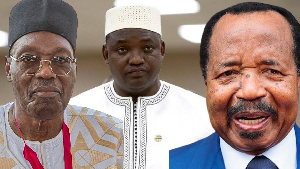Development is what every visionary nation strives for – and it must be the foundation of any government. In a society where the leadership lacks vision for sustainable development, the people perish. The world worries so much about the growing number of terrorist movements, rebellions and popular uprisings in most parts of the world, especially in Africa. Why? It is impossible for peace to be established on this earth without fundamentally haven’t installed sustainable development that is largely felt by the poorest in the society.
Some school of thought argues that all cannot be economically, politically…equal in the society. Agreed! However, majority of the people if not all must be free from economic tyranny, political slavery and intellectual dependency: this is without contest one of Africa’s headaches.
What development means to Africans Fifty five years after independence, most African nations continue to struggle to attain some heights of (economic) freedom despite having in their possession some of the world’s most valuable natural resources to mention among others crude oil, gold, timber, diamonds and other agricultural produces namely cocoa and coffee and so on.
In a human context, development is a process that brings about progress and ameliorates the living conditions in a person’s life. More importantly, it must be felt in the economic aspect of the person’s life – that is economic development. The changes caused by this process must without deviation add value and significance to one’s life as time passes by.
Several people confound economic growth and economic development; this is to say that once a country undergoes some change in terms of her economy that generates growth, the impact is automatically felt by the larger populace. No, it is completely erroneous, economic growth does not generate popular wealth.
What peace means to Africans Indeed, peace is not the absence of war, conflicts or any other form of social insecurity as many people think, especially in Africa. It is from within the heart of humans that war begins and it is also from within the same heart that peace reigns. This is a fact that many including politicians ignore when addressing issues in relation with insecurity or security. It is yet again palpable that humans are not born and baptised terrorists, rebellious… on the contrary they become threats to the society depending on what they see happen around them.
Insecurity in Africa There is a number of issues that trigger insecurity in Africa, susceptible to degenerate into civil wars, endemic conflicts and rebellions: among others are bad governance, political robbery otherwise known as corruption (I chose to call it thievery), foreign interference in internal African affairs, economic crimes, imposition of incompatible foreign (western) culture, tribalism and regionalism, unjustifiable social and economic inequality, injustice, cronyism and favouritism, racism, xenophobia and homophobia.
The Nigerian case Nigeria, just like many other African countries suffers from serious security issues resulting in thousands of deaths and incalculable social damages. In fact, the state of insecurity in Nigeria has become seemingly permanent as attacks perpetrated by BokoHaram, a radical Islamic group are gaining more grounds and are becoming overly alarming.
Boko Haram and History ? It will be hypocritical and indeed naive for anyone to deny the fact that the main causes of the Islamic uprising in Nigeria are as results of the non-implementation of Sharia (Islamic law) and the wide imbalance between the South and the South. This issue must be perceived in a more historical way as it has its root back to colonialism (and cuts across many African countries in a diverse way, more especially West African countries).
During the colonial period, virtually all colonial masters settled at the coastal end, the southern part of many African countries. One reason which may account for this is the means of transport at the time. They came mainly by water (sea, lakes etc.). Consequently, the southern regions and states hosted [most] colonial administrations. This allowed for the construction of (government) edifices, (missionary) schools, hospitals, and other infrastructures in cities located at the south. Obviously, only southerners benefited and continue to benefit from these amenities. The result is the socio-economic and educational imbalance between the North and the South.
However, in the case of Nigeria, the northern states resisted the creation of missionary schools and the construction of some western style infrastructures owing to religious and ideological differences. Northern Nigerian states are primarily made up of Muslims who are radically opposed to western culture, teachings and civilisation. What this means in the context of empirical analysis is that majority of northern populace in Nigeria are illiterate; limiting their chances of getting hold of gainful employments that could improve their living conditions. Eighty percent (80%) of women in southern Nigeria are literate as against between five and ten percent (20%) [1]in the north. Even after gaining independence, the trend and tendencies did not change. But this is not an attempt to reject the fact that education based on western concepts is the answer to Africa’s greatest challenges.
Nigeria, Boko Haram and Sharia Sharia is the law that governs a Muslim’s lifestyle. It sets out rigorous rules, regulations and norms that must be adhered to as a “legal” Muslim and it cuts across all aspects of human life including economic, political, social and spiritual. Any deviation or disobedience to the law may attract terrible punishments such as death, imprisonment, amputation, stoning, flogging, banishment… and counting. Some great Islamic scholars (including politicians) however disagree with the above interpretation of the law. A practical example is Muammar Gaddafi who strongly opposed its implementation.
In Nigeria, the catalyst progression of the law took place when the then governor of Zamfara state in north-west of Nigeria, Ahmed Yeriama introduced and consequently passed the Sharia law in 2000. In the same light, other eight northern states also adopted the law and put it into force. The consequential aspect of the evolution was that the then Boko Haram leader, Mohammed Yusuf expected the law to be equally fully implemented in his hometown, Borno state. He together with his followers became disgruntled as the law was only partially implemented.
The implication was the foundation of Boko Haram in 2002 in the city of Maiduguri by Mohammed Yusuf with the aim of establishing a Sharia government in Borno sate and eventually northern Nigeria. During this period, they became more dangerous and hostile to the government and undertook a number of attacks leading to the loss of hundreds of lives – and the government did nothing.
Political weakness and Insecurity in Africa Sad it is to note that, in Africa, politicking has become increasingly business-oriented which only benefits few in the society as the larger populace suffers from hunger, malnutrition, and preventable diseases… poverty in short. It is as a result of the weak and incompatible nature of the sate inherited from colonialism and current institutional and structural adjustments driven by neo-colonialism.
The Boko Haram phenomenon could be cited as a practical example. Successive Nigerian governments failed to act to protect the larger interest of the population when the sect began to show signs of hostility even towards innocent citizens. The government – politicians are partially responsible for the current permanent state of insecurity in the country.
Because the state in Africa is naturally incompatible, inadaptable and alien to African indigenous practices and institutions, the immediate end product is bad governance which fosters for example corruption, socio-economic inequality, and injustice – all hindrances to sustainable development and threats to social stability.
Reference 1. Unicef – Nigerian Country Office Information Sheet, 2007 http://www.unicef.org/wcaro/WCARO_Nigeria_Factsheets_GirlsEducation.pdf
Opinions of Friday, 16 January 2015
Auteur: Isidore Kpotufe















